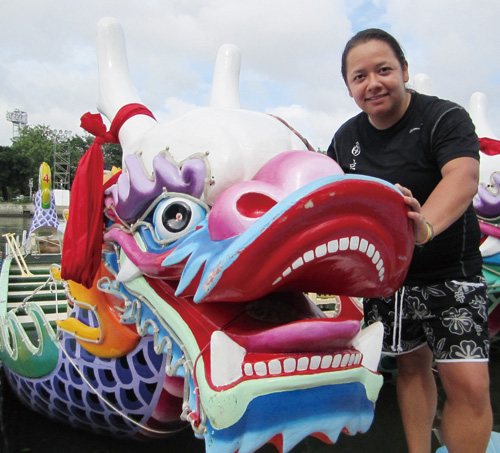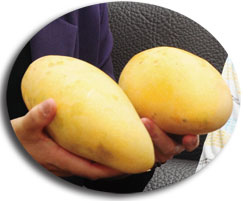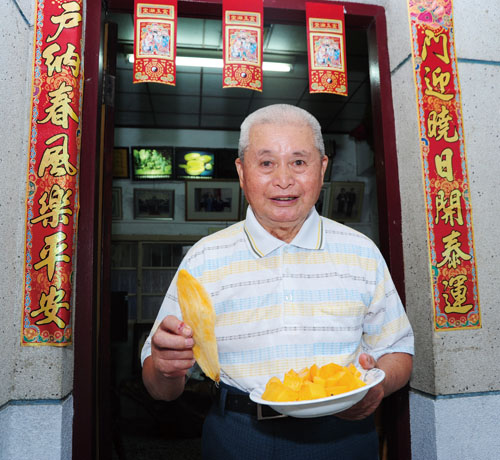The Perspectives of International Student Dunia Lealtobar/Dunia的美好仲夏時光
The Perspectives of International Student Dunia Lealtobar
◎English translation: Lin Fu-ju
◎Photo by Hou Ya-ting
Guatemalan international student Dunia Lealtobar, is new to Kaohsiung and has just finished her first year of National Sun Yat-sen's IMBA program. She is also currently studying Chinese and believes it is one of the world's most important languages. She describes the reason she came to study in Taiwan was due to its good level of education, economic prosperity and respectful people. She admits she was amazed at how well-developed Kaohsiung's transportation systems and infrastructure were. She observed how symbolic the ocean and harbor were to Kaohsiung as they are connecting the city with the rest of the world. She also mentioned she was enjoying the weather in Taiwan.
This year Dunia Lealtobar, and her twenty-two classmates from eight countries, practiced for two and a half months and participated in Kaohsiung City Government's Dragon Boat Races. As the first paddler, Lealtobar felt the friendship and team spirit was the best part of the practices. She considered they had entrusted her with an important position; as first paddler, she doesn't have to be strong; but during races, she must maintain an steady speed.
Although Taiwan is only a third of the size of Guatemala, she feels Guatemalans are warmer and happier. They usually great each other with big hugs; one of the things she misses most about home. She also admits she has struggled with cultural difference. However, she has been truly touched by the sincere friendship extended to her by her classmates. The university has also assigned two Taiwanese students to assist her with daily living and have become her two best friends in Taiwan.
 Lealtobar recalls when she first arrived in Taiwan, it took her a while to acclimatize to the time difference. Because of culinary differences, She found it hard for her to find dishes that she was used to. She has since come to love Ma Jiang Noodles and Milk Tea. Despite her struggles, she encourages people who come to live in Kaohsiung, to learn Chinese and embrace the local culture.
Lealtobar recalls when she first arrived in Taiwan, it took her a while to acclimatize to the time difference. Because of culinary differences, She found it hard for her to find dishes that she was used to. She has since come to love Ma Jiang Noodles and Milk Tea. Despite her struggles, she encourages people who come to live in Kaohsiung, to learn Chinese and embrace the local culture.
Dunia的美好仲夏時光
◎文、攝影/侯雅婷
正值端午節前一天,典型的仲夏日午後,愛河畔聚集練習龍舟的選手,耳邊不斷傳來選手們練習聲。瓜地馬拉籍的杜亦嵐Dunia Lealtobar扎個馬尾,元氣十足、一身俐落地現身愛河畔。Dunia就讀於中山大學高階經營碩士班(EMBA),這是她在高雄的第一年,與來自8個國家、22位同學組團參加高雄市政府舉辦的龍舟賽,Dunia談起練習龍舟2個半月期間,與隊友建立起良好的友誼和團隊精神是這次比賽最寶貴的收獲,擔任龍船隊第一划手的Dunia 有種被信賴的感覺,她說第一划手不必很強壯,但在行進間要保持穩定的速度、不能停頓。
因為相信中文是未來重要的語言,台灣的教育水平、經濟繁榮以及人與人之間的尊敬讓她選擇到台灣學習中文。今年是Dunia到高雄的第一年,Dunia觀察台灣面積僅為瓜地馬拉三分之一大,但是台灣在交通和建設上的高度發展讓人刮目相看。Dunia說瓜地馬拉人比台灣人更為開心、也更加熱情,見面時會大方的給予擁抱,這讓初到台灣的她非常想念故鄉那種毫不忸捏的熱情。
Dunia說高雄的海洋和港口是高雄最具代表性的意象,且藉由海洋與高雄港,高雄與世界聯結,Dunia誇獎高雄的天氣更是全台灣最棒的!而中山大學同學們誠摯的友誼讓她很窩心,學校也派兩位小天使來照顧她,更成為她最要好的朋友。
談起來台經歷過文化差異,她說一開始最難適應的是時差,緊接而來的是飲食差異,Dunia發現在台灣找不到接近家鄉的口味,生性開朗樂觀的她調整心態後,從此愛上了台灣的麻醬麵和奶茶,Dunia特別喜好奶茶不要加珍珠。Dunia以自身的經驗建議來到高雄的外國朋友不要害怕新的文化,應該要試著學中文,增進對本地文化更深一層的了解。
 Father of the Jinhuang Mango: Huang Jin-huang
Father of the Jinhuang Mango: Huang Jin-huang
◎English translation: Lin Yi-chun
◎Photo by Pao Chung-hui
"All the Jinhuang mangos on the market today are the result of my research and improvement, and they are from Liouguei!" Huang Jin-huang, now in his 80s, says proudly. The mother tree which caused the "Jinhuang whirlwind" in Taiwan still stands in Kaohsiung City's Liouguei District, bearing witness to Huang's devotion to agricultural improvement.
Huang Jin-huang was born and raised in a farming family. He initially planted a foreign variety of mango, but the crops did not meet his expectations. He then began doing research by himself to develop a new variety. The cultivation of a new and improved variety is a long journey, he says. Huang devoted 12 years to the creation of the Jinhuang mango, initially studying the advantages and disadvantages of foreign mango varieties, through graft hybridization, to the later stages of observing the growth and stability of the trees, as well as their resistance to disease. He also judged the appearance and taste of the fruit. Finally, the Jinhuang mango –hailed as the king of mangos and averaging 1.2 kg –was launched onto the market in 1978.
The Jinhuang mango has a golden Peel on the outside, thick pulp and a thin pit. The texture of the pulp is firm and the taste is sweet and aromatic. These characteristics enabled the mango to target the market from the top of the pyramid. They were sold at what was then called President Department Store as well as at upmarket fruit specialists. At the time, the average monthly wage was about 3,000 NT dollars, yet because of their popularity, Jinhuang mangos could command a price of 100 NT dollars per catty (0.6 kilogram). Its tremendous economic value, together with the low planting threshold which meant it could be planted with simple and inexpensive grafting, prompted a lot of farmers to follow in Huang's footsteps and cultivate Jinhuang mangos. The Jinhuang mango has also written a splendid page in the history of Taiwanese agriculture.
 Looking back on his journey, he smiles and says, "I am just very happy seeing people enjoy their Jinhuang mangos." Although Huang has not engaged in farming activities for a long time, agriculture still has a big place in his heart. He hopes the government can assist farmers to venture out into foreign markets and stabilize prices to ensure they make a decent living.
Looking back on his journey, he smiles and says, "I am just very happy seeing people enjoy their Jinhuang mangos." Although Huang has not engaged in farming activities for a long time, agriculture still has a big place in his heart. He hopes the government can assist farmers to venture out into foreign markets and stabilize prices to ensure they make a decent living.
金煌芒果之父黃金煌
◎文/林旻伶
◎攝影/鮑忠暉
「現今市面上的金煌芒果是我研發改良的,它們全源自六龜!」現年八旬的黃金煌語帶驕傲地如是說,而當年掀起全台「金煌風潮」的原生母樹仍靜靜地佇立六龜一隅,見證著他在農業改良上的心血點滴。
出身農家的黃金煌,最初種植的是外來的芒果品種,但因作物收成不如預期,引發了他自行研究改良新品種的念頭。他說,培育新品種是一條漫長的路,從研究洋芒果的優缺點、接枝雜交,到依據後代果樹的生長情形、抗病性、穩定度及果實外觀口感等逐一篩選,歷經長達12年的研究投注,被喻為芒果之王、平均果重約1.2公斤的「金煌芒果」終於在民國67年正式上市。
金煌芒果外觀金黃碩大、肉厚籽小、口感香Q、甜度極高,甫推出即鎖定頂級客層,於當時的大統百貨及高級水果行販售,在平均月薪三千多元的年代,一斤價格高達百元,足見其受歡迎程度。由於金煌芒果的高經濟價值 ,加上種植門檻低、嫁接即可生長,成本相對低廉,吸引許多農民跟進種植,金煌芒果為台灣農業發展史寫下輝煌的一頁。
回首過往,早已退休的黃金煌笑著說:「只要看見大家吃金煌芒果就覺得很開心!」言談間他也表達對台灣農業的關心,他希冀政府能夠協助開拓外銷市場並穩定價格。